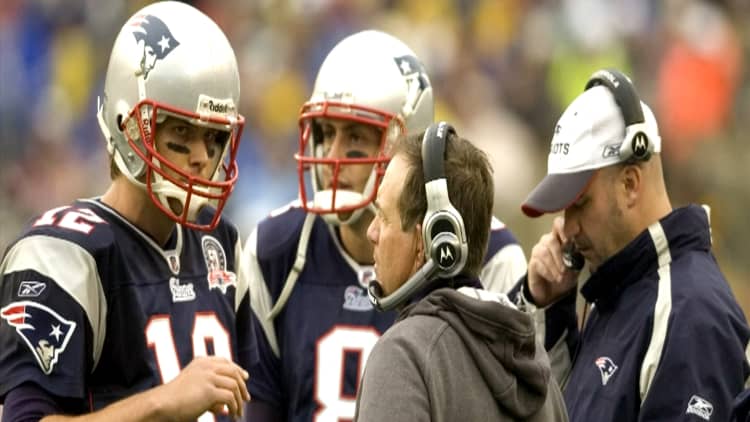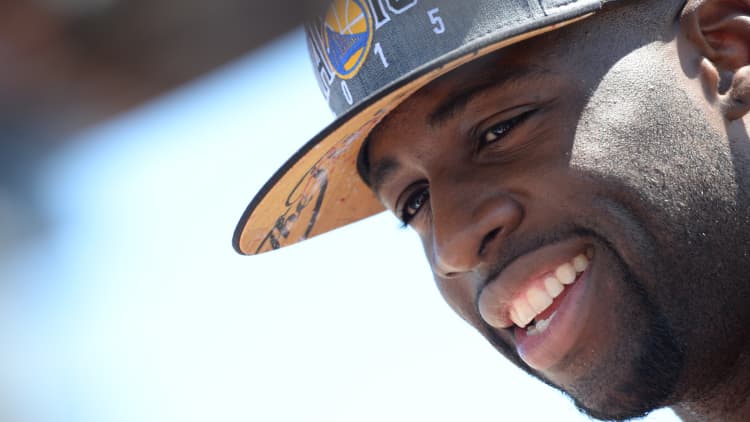It was the fourth quarter on December 13, 2009, and Brandon Marshall, the former Denver Broncos' wide receiver, had 18 catches against the Indianapolis Colts, but he wasn't counting. In fact, he had no idea he was two catches away from tying Terrell Owens' single-game receptions record and three away from beating it.
That is, until one of his teammates came up to him on the sideline and informed him. "That's when his whole focus shifted," Graham Betchart, the director of mental training at Lucid Performance, tells CNBC Make It. He began to think about that 21-catch mark. "His energy changed to someone obsessed with results."
Worrying not about results, says Betchart, but about what you can control — attitude, effort and focus — is the key to success.
"Having an extremely positive attitude, having your effort be everything you've got, and then simply focusing on the task at hand," says Betchart, those are the things you need to do.
And those are the things you can use in your career to thrive. Misplacing your attention on what is out of your hands, like your sales numbers or a judge's decision or a surgery outcome, will cost you.
It certainly cost the Broncos. They decided they wanted to help Marshall beat the record and would set him up with three easy catches so he could. But, as Marshall told Betchart, the pressure in the huddle was overwhelming. On the very next play, the quarterback, Kyle Orton, threw the ball right into the ground.
Of course, Betchart concedes, results matter. Players have to score points; teams have to win. But to in order to do so, in order to win — a word that Betchart defines with the acronym: "What's Important Now" — you need presence.
"I consider myself the most competitive person ever," Betchart tells CNBC Make It. "And the way you win is not obsessing on the results. You obsess on the things you can control and then you ruthlessly stick to [them]. I mean ruthlessly, where nothing stops you from doing the things you can control."
Since receiving his masters in sports psychology from John F. Kennedy University in 2008, Betchart has used this lesson in presence to help develop countless athletes, including three recent NBA No. 1 draft picks — the Philadelphia 76ers' Ben Simmons, as well as the Minnesota Timberwolves' Karl-Anthony Towns and Andrew Wiggins.
When these players are at their best, says Betchart, though it seems counter-intuitive, they don't know if they are making or missing shots. They have no idea what their numbers are.
Jaylen Brown of the Boston Celtics, who earlier this week became the third NBA player to sign with Lucid, offers another example. "His best game in college [with UC Berkeley]," says Betchart, "was when he played against Utah. At Utah you cannot see how many points you have. The scoreboard is out of sight."

As Brown explained it to Betchart, his mental coach, after that career-high 29-point-game, he was totally present, trusting his shot and not distracted by results.
A present mindset is demanded of NBA players off the court, too. With the $2.6 billion television deal that took effect during the 2016-17 season, players' salaries have been skyrocketing. Steph Curry, for instance, just signed a $201 million contract over five years.
By the way, it's not just the greats. Last year Timofey Mosgav signed a four-year, $64 million contract after a season where he averaged 6.3 points a game.
"A contract year can put a lot of pressure on a player," says Betchart. When there's a $100 million riding on his performance and the stakes are so high, he has to be mentally fit to be present in the game.
It's the same when players compare themselves to others. Betchart has worked with some who've signed $15 million contracts and felt awful because a rival signed for $30 million, as though their new salary had become, by comparison, obsolete.
"It all goes back to, 'What can I control?'" Betchart says.
In the fourth quarter of that 2009 Broncos-Colts game, Orton connected with Marshall three more times to get him 21 catches and have him beat the record. But Marshall told Betchart, "They were the most miserable, hardest catches to make."
"Imagine how many catches I would've had if I just stayed present," Marshall added. Imagine what would've happened if he focused on what he could control.
Like this story? Like CNBC Make It on Facebook.
Don't Miss: Mental coach of 3 top NBA draft picks shares 7 ways you can thrive under pressure



